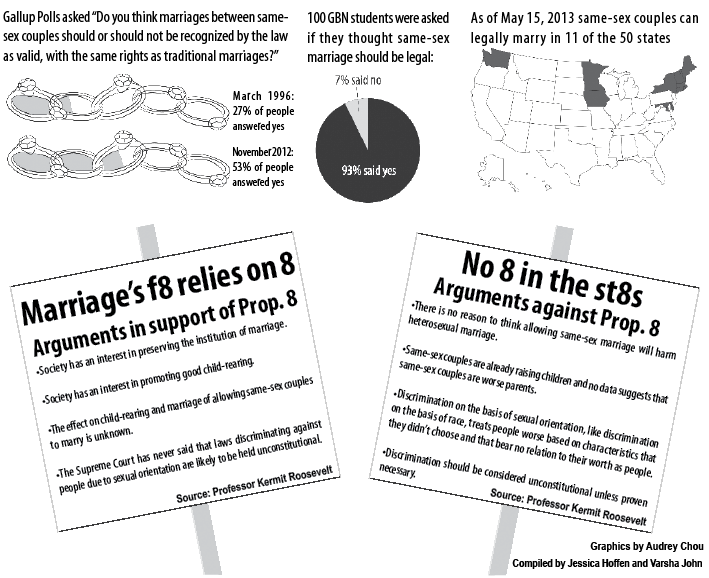Question & Answer with Kermit Roosevelt, University of Pennsylvania Professor of Law
In 2009 two California couples attempted to file for marriage licences. They were denied. The reason? Both couples were gay, and, according to California’s Proposition 8 amendment, marriage can only occur between a man and a woman. The couples challenged the 2008 amendment claiming that it violated their 14th amendment rights. The United States District Court for the Northern District of California sided with the couple, striking down the law. However, Californians in favor of Proposition 8 appealed to the Ninth Circuit Court, which upheld the District Court’s ruling. Those proponents then appealed to the Supreme Court which agreed to hear the case.
Q: What are the potential ways the court could rule and the precedents those rulings could set?
A: The court could rule broadly in either direction — it could say that there is a right to same-sex marriage that all states must recognize, or it could say there is no such right and all states can do what they want. It could also issue a narrow pro-same-sex marriage ruling that would affect only California, or one that would affect only states that currently allow same-sex civil unions. Or it could dismiss the case without deciding the issue at all — which I think is most likely.
Q: Why would the court choose to dismiss the case and what does this say about our society and/or our government?
A: I think the court is likely to dismiss the case because it’s not ready to take the step of recognizing a right to same-sex marriage, but it also doesn’t want to deny that right. It is likely to take a later case … and recognize the right then. This suggests that constitutional interpretation is affected by social context, which I think is definitely true.
Q: If the court chooses to issue a narrow ruling, dismiss the case or say there is no right to same-sex marriage, what do you think will be the next step for same-sex marriage advocates to take?
A: I think the next step for same-sex marriage advocates is to continue the state by state campaign. As more states recognize same-sex marriage, it will be easier to say whether it has harmful consequences or not.
Q: What does it say about the U.S. that this case is being heard?
A: That this case is being heard suggests that the U.S. is at a transitional moment with same-sex marriage. Also that we tend to have social disputes resolved by courts.
Q: Is the court’s decision to hear this case progress for same-sex marriage?
A: This case … indicate[s] progress for the cause of same-sex marriage. Ten or fifteen years ago the [Supreme] Court would probably not have taken the arguments seriously.
Q: What shifts in public opinion regarding same-sex marriage have you noted and why do you think they have occurred?
A: There have been dramatic shifts in favor of public support for same-sex marriage in the past [10] years or so. I think this happened because even opponents of gay marriage are as likely as anyone else to find out that they have a gay child. When that happens, they tend to change their minds. This didn’t happen as much until recently, because anti-gay prejudice drove many people to hide their sexual orientation. But once gays and lesbians stopped closeting themselves, many more people realized that they had gay friends or family members, and that changed their minds. … Positive depictions of gays in popular culture … probably helped.
Q: Many say ‘legalizing same-sex marriage is inevitable, it’s only a matter of time.’ What is your view on that concept? Do you think now is the right ‘time’ for legalizing same-sex marriage?
A: I agree that it’s only a matter of time. Public opinion is very much pro-same-sex marriage in the younger population; opponents are largely older. I think now is a fine time.
Q: Is there anything else you would like to add?
A: I think in 10 or 15 years, people will look back on this debate and be astonished at how silly the arguments against same-sex marriage seem. I think the future will look back on this debate very much the way


